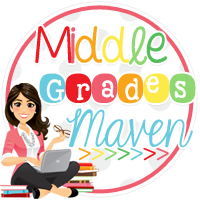I taught two years in 4th grade before I moved to middle school. That first year as a middle school teacher was a huge learning experience - most of it was learning through failure. I was slightly intimidated by the fact that I was teaching 8th graders, so I thought the key to my success was to be "friends" with my students. That literally should be on the top of the list of things NOT to do as a teacher. I remember telling my class on the first day, "I don't care what you did last year, yesterday or 10 minutes before coming into my classroom. You are here for a fresh start." That's a really terrible thing to say to a classroom full of students who have had a long history of trouble making. I was honestly, terrified of some of my students. I had fights in my room that involved chairs, and students, being thrown. It was impossible to have control over people I feared - people who knew I had zero clue what I was doing.
One day... I gave up. I was so frustrated with the lack of respect that I broke down in tears and walked away from my class. I grabbed my things and told my principal I was going home sick. I wouldn't recommend doing that. Not at all. Looking back, I’m pretty impressed that I didn’t get fired! I hated my job that year. Every single second of it.
The next school year, I spent the majority of the school year pregnant with my first child. I gained a TON of weight and ended up swelling like a balloon and having elevated blood pressure (imagine that). To avoid my doctor forcing me out of work, I did nothing but sit on a stool for the last few weeks before my daughter was born. My classroom management pretty much didn’t exist because I was miserable. I went out on maternity leave in March and returned mid-May. My long term sub was a “friend” to my students (remember how well that worked for me the year before?) and my classroom was an absolutely nightmare when I returned. I was not able to get things back on track and the remaining few weeks of the school year had me on survival mode. NOTE: If you have a baby, do NOT return for just a week or two at the end of the school year. Trust me on that one. Take the unpaid leave {if you can} and just stay home!
The third year teaching middle school was a HUGE year for me. It was the year I finally figured it out. I didn’t try to make my students like me. I didn’t try to make my students fear me. I was determined to make my students respect me. I had very clear classroom expectations and procedures for every little thing. My students knew what to do if they were absent. They knew I didn’t lend out pencils. Ever. They knew I didn’t take late work. Ever. I didn’t bend for anyone. BUT… they knew I respected them. If they were having a bad day, I’d find a way to touch base with them before class or during the warm up. If I caught wind of them acting foolish in another class, I'd talk to them to find out what was happening. If I knew a student was dealing with something at home, or had a sporting event coming up, I would talk to them about it. My students knew I cared about them – but they also knew my rules for them. My classroom was suddenly a much more manageable place than years before.
A few weeks into the school year we had an intake meeting for a new student. All I was told is that he was coming from an alternative education school in the next state and he was going to be in my math class. During the meeting, the vice principal and other classroom teachers were very stern with him. Almost mean. He was so polite to everyone, “Yes ma’am” and “No sir” to all the adults even though they were treating him as though he was a problem before he even started. I made the decision to treat him like my other students, regardless of his circumstances. A few days after our meeting, I asked about him. I was told that he had just been released from jail for armed robbery. He was the one with the gun. He ended up being a student who LOVED math, which made me super happy. He was one of my favorite students that year. He didn’t give me a single issue all year, even though he had a tough thing going in the community and was an issue for other teachers.
From that year on, I maintained my philosophy that in order to have a truly successful classroom, my students were going to have to respect me. Not be afraid of me, not hate me, and not want to be my friend. Each year, the types of students I had didn’t change. I had many students come through my room who were absolutely terrible in other classrooms, but they were different for me. Now, I certainly DID have my problem students. Whether they just hated math, or me, or my rules... they were not fun to have in class. I didn’t let those students bring down my attitude or the rest of my class. Even though we are the teachers and we are the adults, we need to RESPECT our students. They are people too and they deserve the same respect that we command from them.
So, there you have it. Successful classroom management begins and ends with RESPECT.










